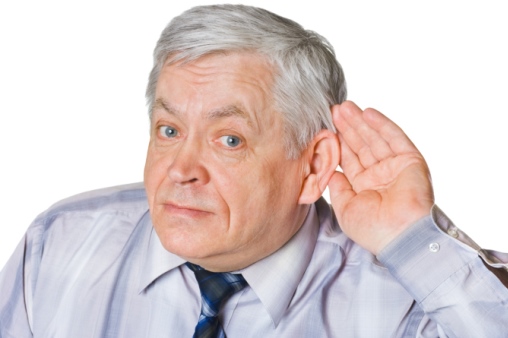 A few days ago when I turned up the volume on my phone to listen to some music, a message popped up reading, “Listening at high volume can cause hearing damage …”
A few days ago when I turned up the volume on my phone to listen to some music, a message popped up reading, “Listening at high volume can cause hearing damage …”
I know some people find this message more annoying than helpful, but considering that approximately 20% of adults in the U.S. have some degree of hearing loss, it’s a warning that should not be taken lightly.
Causes and Symptoms of Hearing Loss
In the U.S., more than half of the population over the age of 50 has some degree of hearing loss. I can’t blame listening to loud music as the sole source of hearing loss; it could be attributed to a number of factors. Here are a few common causes of hearing loss for adults:
• Age: Age-related hearing loss, or presbycusis, can be attributed to changes that occur in the inner ear throughout the years. The loss of hearing typically doesn’t happen suddenly; it gradually occurs as each year passes. Age-related hearing loss is sometimes confused with symptoms of dementia.
• Noise: Noise-induced hearing loss can happen suddenly (i.e. as a result of a loud, sudden noise or explosion), gradually over time (i.e. from consistently listening to loud music or working in a noisy environment), or exposure to loud everyday appliances (i.e. lawnmower, hair dryer, etc.).• Clogged ears: According to the American Academy of Otolaryngology, more than 12 million people will visit the doctor a year to have earwax removed. In many cases, earwax builds up and hardens because water gets into the ear, causing the wax to swell up and eventually clog the ear. Symptoms of a clogged ear include dizziness, severe aching, and a “full” feeling in the ear. If this occurs, you should visit a doctor or an otolaryngologist. Treatments include manually removing the wax, wax-dissolving solutions, or squirting water into the ear canal to break up the wax and empty the canal.• Undiagnosed allergies: Our sinuses can be blocked by several things, including the common cold, sinus infections, and allergies. All three can cause temporary hearing loss, because the Eustachian tube, which is responsible for regulating ear pressure, is closed completely shut. The average amount of colds an adult will experience each year is three, and in most cases, the cold can last anywhere from a week to 10 days. If your symptoms worsen or last for more than two weeks, there may be something else wrong aside from the common cold.
• Non-steroidal anti-inflammatory drugs (NSAIDs) or medications: If you take high doses of aspirin or any other NSAID, it can cause tinnitus, a disruptive irritating noise in the head. NSAIDs can also disable the ear’s protective outer hair cell, which can make your ears more susceptible to sound damage. Some chemo drugs can also result in temporary hearing loss or tinnitus. If you start to notice a ringing sound while on your medications, make sure you consult with your doctor immediately.
Protect Your Ears from These Devices
Did you know that some common household appliances can actually be harmful to your ears? You may use these devices on a regular basis, but over time, they might contribute to hearing damage. Keep in mind that sound intensity is measured in decibels (dB), so noise-induced hearing loss can be the result of exposure to sounds at or above 85 dB over an extended period:
• Hair dryer: At approximately 80 dB to 90 dB, the loud, powerful whirring noise of a hair dryer can contribute to noise-induced hearing loss, especially because of how close the device can get to the ears.
• Blenders and coffee grinders: Most models that you purchase at the store land in between the 80 dB to 90 dB range. To soften the noise, try wrapping a large kitchen towel around the base where the motor is placed.
• Lawn mower/snow blower: These appliances can reach up to a whopping 106 dB on the loudness chart. That means mowing the lawn twice a week, for one hour each session, over the summer can eventually contribute to noise-induced hearing loss.
Natural Methods to Prevent and Treat Hearing Loss
1. Ginkgo biloba: This herb has been known to be very beneficial for those who have suffered nerve deafness. Ginkgo biloba will increase cerebral and peripheral blood flow, which will lead to the improvement of nerve transmission. Take 60 mg three times a day.
2. Acupressure: Acupuncture is widely being used as a safe, alternative method to treat sudden hearing loss. Proponents say that acupuncture can help treat aggravating hearing conditions such as tinnitus or excess earwax.
3. Proper diet: Incorporating antioxidant-rich foods into your diet, such as berries, kale, pumpkin, and squash can help protect your hearing.
Sources:
Girdwain, J., “3 Ways To Reverse Hearing Loss,” Prevention web site, November 3, 2011; http://www.prevention.com/health/health-concerns/prevent-and-reverse-hearing-loss.
“Hearing Loss Natural Remedies,” DavesHealingNotes.com; http://www.daveshealingnotes.com/ailments/hearing-loss-natural-remedies.html, last accessed June 9, 2015.
“Natural remedies for hearing loss,” Five Remedies web site; http://fiveremedies.com/infections/natural-remedies-for-hearing-loss/, last accessed June 3, 2015.
“Basic Facts About Hearing Loss,” Hearing Loss Association of America web site; http://www.hearingloss.org/content/basic-facts-about-hearing-loss, last accessed June 9, 2015.
“Hearing loss,” Mayo Clinic web site; http://www.mayoclinic.org/diseases-conditions/hearing-loss/basics/risk-factors/con-20027684, last accessed June 9, 2015.
“Prevention of Hearing Loss,” Hearing Loss Association of America web site; http://www.hearingloss.org/content/prevention-hearing-loss, last accessed June 9, 2015.
